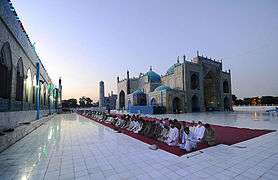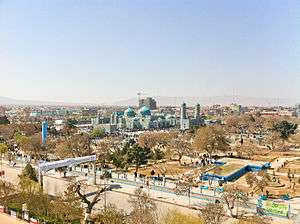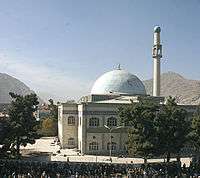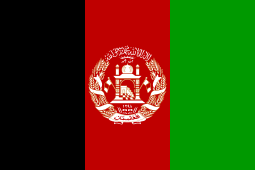Shrine of Ali
| Blue Mosque | |
|---|---|
| Rawze-e-Sharif | |
 | |
| Basic information | |
| Location | Mazar-i-Sharif, Afghanistan |
| Affiliation | Islam |
| Architectural description | |
| Architectural type | Mosque |
| Architectural style | Islamic |
| Completed | 1481 |
The Blue Mosque is a mosque located in the center of Mazar-i-Sharif, Afghanistan.
The Seljuq dynasty sultan Ahmed Sanjar built the first known shrine at this location. It was destroyed or hidden under earthen embankment during the invasion of Genghis Khan in around 1220. In the 15th century, Sultan Husayn Mirza Bayqarah built the current Blue Mosque here. It is by far the most important landmark in Mazar-i-Sharif and it is believed that the name of city (Noble Shrine, Grave of Sharif) originates from this shrine.
A site plan of the location made in the 1910s shows that there had earlier been a smaller walled precinct in the mosque, which was razed to create parklands later, although the portals to this precinct still remain as gateways for the shrine.[1]
Tombs of varying dimensions were added for a number of Afghan political and religious leaders over the years, which has led to the development of its current irregular dimensions. These include the square domed tomb of Amir Dost Muhammad, Wazir Akbar Khan and a similar structure for Amir Sher Ali and his family.[1]
According to a local legend here has been buried Ali who reportedly was brought here by a white camel in order to save his remains from the desecration by his enemies. Most Muslims though consider that Ali is buried in Imam Ali Mosque, Najaf in Iraq.
Gallery
 Muslim men praying during the 2012 Ramadan
Muslim men praying during the 2012 Ramadan- Entrance to one of the buildings
 The Sultan Ahmad Mosque
The Sultan Ahmad Mosque Looking at the mosque from a far distance during the 2011
Looking at the mosque from a far distance during the 2011- White Pigeons by the Blue Mosque
 Close up
Close up Persian-style tile work
Persian-style tile work
See also
References
| Wikimedia Commons has media related to Blue Mosque, Mazar-e-Sharif. |
- 1 2 "Mazar-e Sharif, Afghanistan". ArchNet. Retrieved 5 May 2014.
Coordinates: 36°42′30″N 67°06′40″E / 36.70833°N 67.11111°E

